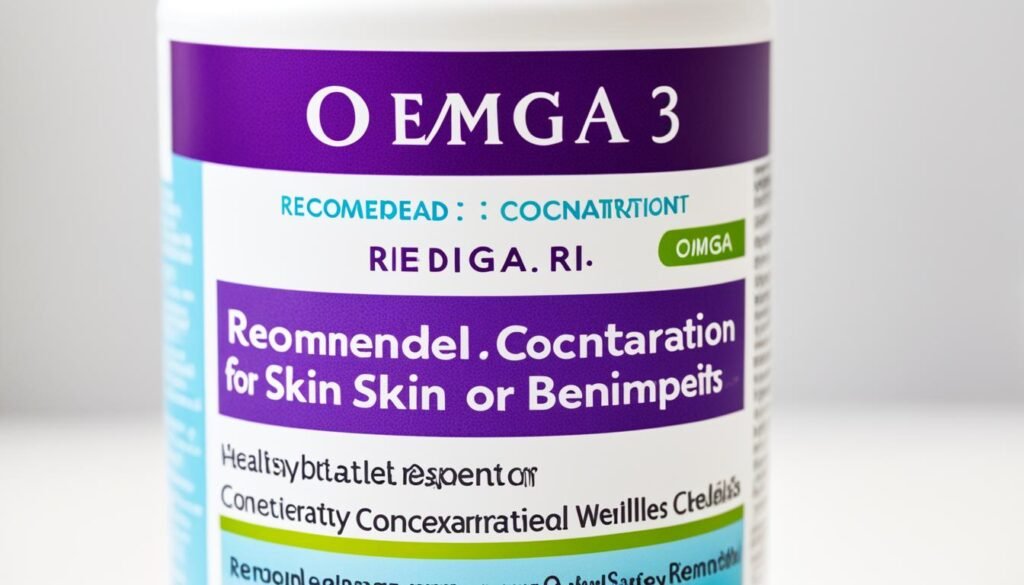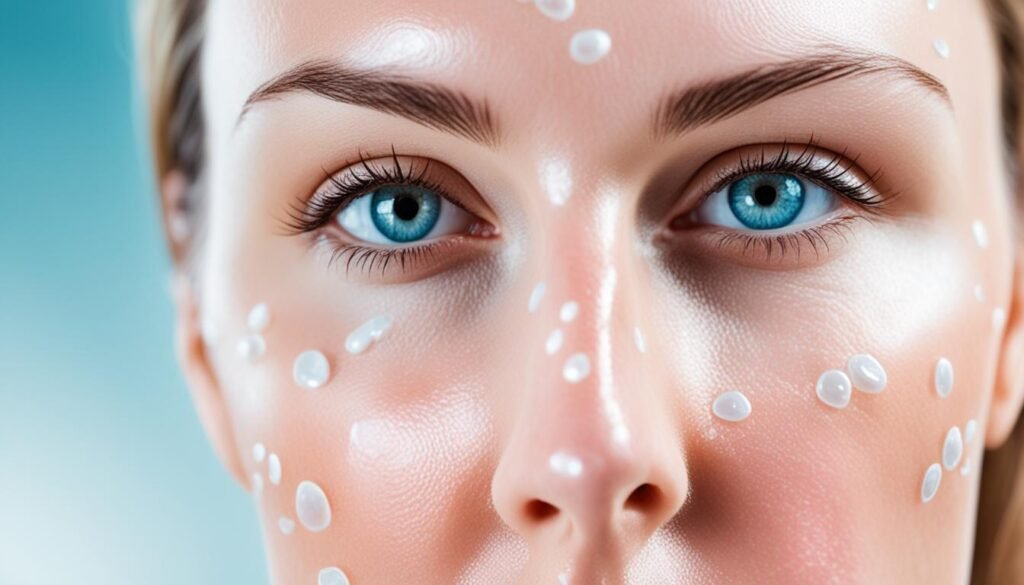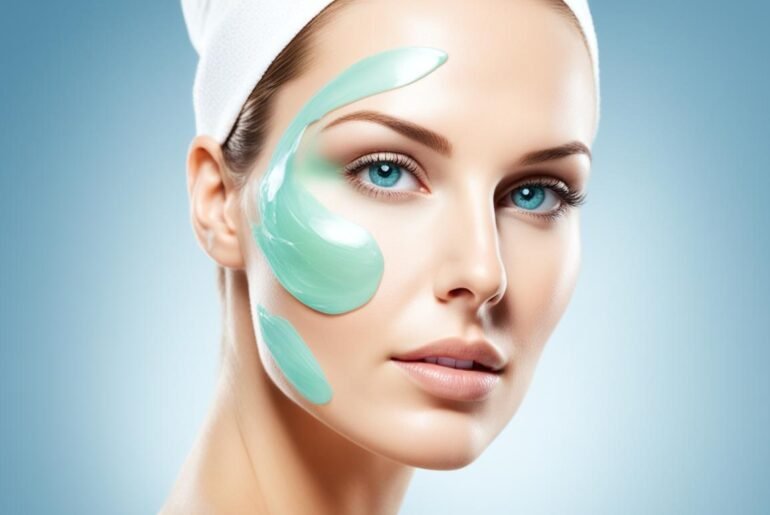Did you know that sensitive skin affects approximately more than 50 million Americans? If you have sensitive skin, you understand the struggle of finding the right products that won’t cause irritation or redness. But what if there was a natural remedy that could alleviate your skin sensitivity and provide numerous other skincare benefits?
Enter omega-3 fatty acids. These essential nutrients, commonly found in foods like fish oil and seafood, have been proven to have a significant impact on sensitive skin care. Not only do they help regulate oil production and improve hydration, but they also reduce breakouts and minimize signs of aging. Omega-3s even have a soothing effect on dry and irritated skin, boosting its immunity to UV damage and skin cancer.
If you’re looking for a natural solution to your sensitive skin woes, omega-3 fatty acids may be the answer you’ve been searching for. In this article, I will explore the benefits of omega-3s for skin health, the best sources of omega-3s, and how they interact with the skin to provide relief. Let’s dive in!
Key Takeaways:
- Omega-3 fatty acids can be a game-changer for those with sensitive skin.
- They regulate oil production, improve hydration, and reduce breakouts.
- Omega-3s have a soothing effect on dry and irritated skin.
- They boost the skin’s immunity to UV damage and skin cancer.
- Explore the benefits of omega-3s for your skin and discover the best sources for optimal results.
What are Omega-3 Fatty Acids and What They Do for Skin?
Omega-3 fatty acids are essential nutrients that play a crucial role in promoting skin health. These fatty acids can be found in certain foods and offer a wide range of benefits for the skin. Let’s take a closer look at how omega-3 fatty acids can improve the health and appearance of your skin.
The Skin Benefits of Omega-3s
Omega-3 fatty acids have a positive impact on various aspects of skin health. Here are some key benefits:
- Regulate Oil Production: Omega-3s help balance oil production in the skin, reducing the risk of clogged pores and breakouts.
- Improve Hydration: These fatty acids enhance the skin’s ability to retain moisture, keeping it hydrated and preventing dryness.
- Reduce Breakouts: Omega-3s possess anti-inflammatory properties that can calm down skin inflammation and reduce the frequency and severity of acne breakouts.
- Minimize Signs of Aging: By reducing inflammation and maintaining proper hydration, omega-3s can help minimize the appearance of fine lines, wrinkles, and other signs of aging.
- Soothe Irritation and Dermatitis: Omega-3s have a soothing effect on irritated and inflamed skin, making them beneficial for conditions like eczema and dermatitis.
- Enhance UV Protection: These fatty acids boost the skin’s natural defense against UV damage, protecting it from harmful UV rays and reducing the risk of skin cancer.
By incorporating omega-3 fatty acids into your diet or skincare routine, you can enjoy these fantastic skin benefits and achieve a healthier and more radiant complexion.
Foods Rich in Omega-3s

When it comes to incorporating omega-3 fatty acids into your diet, there are various sources to choose from. While fish oil is perhaps the most well-known source, there are also vegetarian options available. Let’s explore the different foods rich in omega-3s.
Fish Oil
One of the primary sources of omega-3 fatty acids is fish oil. It is derived from fatty fish such as salmon, mackerel, and sardines. Fish oil is known for its high levels of eicosapentaenoic acid (EPA) and docosahexaenoic acid (DHA), both essential omega-3s. These nutrients are easily absorbed by the body, making fish oil an excellent choice for maximizing your omega-3 intake.
Vegetarian Sources
For those following a vegetarian or plant-based diet, there are alternative sources of omega-3s that can be incorporated into your meals. Some of these vegetarian sources include:
- Flax seeds: These tiny seeds are packed with omega-3 fatty acids, fiber, and antioxidants. They can be ground and added to smoothies, oatmeal, or used in baking.
- Chia seeds: Similar to flax seeds, chia seeds are a great plant-based source of omega-3s. They can be added to yogurt, cereal, or used as an egg substitute in baking.
- Soybean oil: Soybean oil contains alpha-linolenic acid (ALA), a type of omega-3 fatty acid. It can be used in cooking or as a dressing for salads.
While these vegetarian sources provide omega-3 fatty acids, it’s important to note that the body needs to convert ALA into EPA and DHA to fully experience the benefits. This conversion process is not as efficient as getting omega-3s directly from fish oil.
Recommended Intake
To ensure optimal omega-3 intake, it is generally recommended to consume two servings of fatty fish per week. Each serving should be around 3.5 ounces (100 grams). If consuming fish regularly is not feasible, fish oil supplements can be taken after consulting with a healthcare professional.
Here is a table summarizing some common sources of omega-3 fatty acids:
| Source | Omega-3 Content |
|---|---|
| Fish oil (salmon, mackerel, sardines) | High in EPA and DHA |
| Flax seeds | ALA |
| Chia seeds | ALA |
| Soybean oil | ALA |
Remember, incorporating omega-3-rich foods into your diet can provide numerous health benefits, including promoting skin health and overall well-being.
How Omega-3s Interact with Skin
Consuming omega-3s has a profound impact on the health and appearance of the skin. These essential fatty acids play a crucial role in improving the fatty acid composition of the skin and balancing its inflammatory response. This, in turn, leads to softer, less inflamed skin and can have a positive effect on various sensitive skin conditions.
The fatty acid composition of the skin is vital for maintaining its barrier function and overall health. Omega-3s, such as EPA (eicosapentaenoic acid) and DHA (docosahexaenoic acid), contribute to the production of lipids that help keep the skin hydrated and supple. They also aid in reducing transepidermal water loss, which can lead to dryness and sensitivity.
Furthermore, omega-3s have anti-inflammatory properties that help regulate the skin’s response to irritants and allergens. By reducing inflammation, they can alleviate redness, itching, and discomfort associated with conditions like eczema, psoriasis, and rosacea.
Studies have shown that omega-3s can also modulate the immune system, influencing the body’s inflammatory response. This can be particularly beneficial in managing chronic inflammatory skin conditions, where excessive inflammation plays a significant role.
Additionally, omega-3s have been found to have a protective effect against the damaging effects of UV radiation. By reducing oxidative stress and inflammation caused by sun exposure, they can help minimize sunburns, sunspots, and other signs of sun damage.
Overall, the interaction between omega-3s and the skin is multifaceted. By improving the fatty acid composition, balancing inflammation, and providing protection against external stressors, omega-3s offer immense benefits for sensitive skin conditions, promoting a healthier and more radiant complexion.
Benefits of Omega-3s for Skin
| Benefit | Description |
|---|---|
| Improved Fatty Acid Composition | Omega-3s enhance the production of skin-healthy lipids, improving hydration and reducing dryness and sensitivity. |
| Reduced Inflammation | Omega-3s regulate the skin’s inflammatory response, alleviating redness, itching, and discomfort associated with conditions like eczema and psoriasis. |
| UV Protection | Omega-3s provide protection against sun damage by reducing oxidative stress and inflammation caused by UV radiation. |
Recommended Concentration for Omega-3 Benefits for Skin

When it comes to reaping the skin benefits of omega-3 fatty acids, finding the right concentration is key. While there is no exact recommendation for the required dosage of omega-3s, health experts suggest a daily intake of 500 mg or two servings of fatty fish per week. This dosage promotes overall wellness and plays a significant role in achieving supple and radiant skin.
Harnessing the power of omega-3s for skin health starts with incorporating them into your daily routine. Whether you choose to enjoy a delicious meal of fatty fish or take high-quality fish oil supplements, the key is to ensure that you are meeting the recommended daily omega-3 intake. This can help optimize the benefits and give your skin the nourishment it needs.
The Importance of Omega-3 Concentration
Ensuring the recommended omega-3 concentration in your diet is essential for a multitude of reasons. Omega-3 fatty acids work to enhance the overall health of your skin by regulating oil production, improving hydration levels, reducing inflammation, and preventing signs of aging. By maintaining a consistent dosage, you can experience the full range of benefits that omega-3s have to offer.
Choosing the right omega-3 concentration for your skin is crucial for maintaining its health and radiance. Whether through a well-balanced diet or omega-3 supplements, meeting the recommended daily intake is a step towards achieving supple and glowing skin.
| Omega-3 Source | Concentration per Serving (mg) |
|---|---|
| Fatty Fish (e.g., salmon, mackerel, sardines) | Varies depending on the fish type |
| Fish Oil Supplements | Varies depending on the brand |
It’s important to note that the concentration of omega-3s can vary depending on the source. Fatty fish like salmon, mackerel, and sardines have different levels of omega-3s. Similarly, fish oil supplements may have varying concentrations depending on the brand. Regularly consuming fatty fish or incorporating high-quality fish oil supplements into your diet can help ensure you are meeting the recommended omega-3 concentration for optimal skin health.
Remember, consistency is key. Make omega-3s a part of your daily routine and let their nourishing properties work their magic. Your skin will thank you with its newfound radiance and vitality.
Myths Surrounding Omega-3 Fatty Acids
There are several common misconceptions surrounding omega-3 fatty acids that need to be addressed. Let’s debunk these myths and provide accurate information about omega-3 supplementation.
Myth 1: All Fish Are Good Sources of Omega-3s
The truth is that different fish contain varying levels of omega-3 fatty acids. Some fish species, such as salmon, mackerel, and sardines, are rich in omega-3s, while others may have lower levels. It’s important to choose fish species that are high in omega-3s to maximize their benefits.
To avoid high mercury levels, it is recommended to opt for smaller fish, which tend to accumulate fewer toxins than larger fish. Additionally, high-quality fish oil supplements can provide a reliable and convenient alternative to consuming fish.
Myth 2: Plant-Based Omega-3s Work the Same as Fish Oil
While plant-based sources like flax seeds, chia seeds, and soybean oil do contain omega-3 fatty acids, they lack certain components that unlock the full benefits of omega-3s found in fish oil. Plant-based omega-3s primarily provide alpha-linolenic acid (ALA), while fish oil contains eicosapentaenoic acid (EPA) and docosahexaenoic acid (DHA).
EPA and DHA are more readily absorbed by the body and have been extensively studied for their health benefits, including their positive effects on the skin. Therefore, it is important to consider both fish and plant-based sources of omega-3s to ensure optimal intake and reap the full benefits of these essential fatty acids.
“It is important to choose fish species that are high in omega-3s to maximize their benefits.”
In conclusion, understanding the truth behind these myths is crucial for making informed decisions about omega-3 supplementation. Combining fish and plant-based sources of omega-3s in your diet can help you reap the full benefits of these essential fatty acids and support your overall health and well-being.
Protection Against Sun Damage

When it comes to protecting your skin from harmful UV rays, sunscreen is typically the go-to solution. However, there may be an alternative worth considering – omega-3 fatty acids. These essential nutrients have been found to increase the skin’s resistance to sunburns and reduce the severity of skin redness after UV exposure.
Omega-3s, commonly found in fish oil and other seafood, have anti-inflammatory properties that can help alleviate the symptoms of certain photosensitivity disorders. While more research is needed to fully understand and confirm these effects, incorporating omega-3s into your diet and skincare routine may offer added protection against sun damage.
Chart: Omega-3s and UV Protection
| Benefits of Omega-3s for Sun Protection | Explanation |
|---|---|
| Increased resistance to sunburns | Omega-3s can enhance the skin’s natural defense mechanisms, reducing the likelihood and severity of sunburns. |
| Reduction in skin redness after UV exposure | Omega-3s may help minimize skin redness and inflammation caused by exposure to UV rays. |
| Potential relief for photosensitivity disorders | Some studies suggest that omega-3s may alleviate the symptoms of certain skin conditions that make the skin more susceptible to UV damage. |
Although omega-3s can provide some degree of sun protection, it is important to note that they should not replace the use of sunscreen. Sunscreen remains the most effective method for safeguarding your skin against the harmful effects of UV rays. However, incorporating omega-3s into your skincare routine and maintaining a healthy diet rich in these fatty acids may offer additional benefits for sun protection and overall skin health.
Reduction of Acne

Acne, a common skin condition characterized by inflammation and breakouts, can be bothersome and impact one’s self-confidence. However, incorporating omega-3 fatty acids into your diet may help prevent or reduce the severity of acne by targeting the underlying inflammation.
Omega-3s are known for their anti-inflammatory properties, which can help calm the skin and minimize redness associated with acne. By reducing inflammation, omega-3s may also help prevent the formation of new acne lesions.
A number of studies have shown promising results when it comes to the role of omega-3 supplementation in the treatment of acne. These studies have found a decrease in the number of acne lesions and overall improvement in the appearance of the skin.
“A diet rich in omega-3s has the potential to reduce inflammation in the body, including the inflammation that contributes to acne.” – Dr. Sarah Johnson
However, it is important to note that more research is needed to fully understand the effects of omega-3s on acne. The severity and underlying causes of acne can vary from person to person, and what works for one individual may not work for another.
As part of an overall approach to acne prevention and management, incorporating omega-3-rich foods such as fatty fish, flax seeds, and chia seeds into your diet may be beneficial. Additionally, omega-3 supplements can provide a concentrated dose of these essential fatty acids.
Omega-3s and Inflammation
Acne is often associated with inflammation in the skin. Omega-3 fatty acids help reduce inflammation by blocking the production of certain inflammatory compounds in the body.
The omega-3 fatty acids EPA and DHA are particularly effective at reducing inflammation. EPA, in particular, has been shown to inhibit the production of pro-inflammatory molecules that can contribute to acne development.
By incorporating omega-3s into your diet, you may be able to address the underlying inflammation that contributes to acne and promote clearer, healthier skin.
Acne Prevention
In addition to their anti-inflammatory properties, omega-3 fatty acids may also help prevent acne by regulating oil production in the skin. Excess oil production can clog pores and contribute to the development of acne lesions.
Omega-3s help balance oil production by regulating the activity of certain enzymes involved in the production of sebum, the skin’s natural oil. By maintaining a healthy balance of oil, omega-3s can help keep pores clear and reduce the likelihood of acne breakouts.
While omega-3s may not be a cure-all for acne, they can be a valuable addition to a comprehensive acne prevention and management plan. Speak with a dermatologist or healthcare provider to determine the best approach for your unique skin needs.
Remember, taking care of your skin involves a holistic approach that includes a balanced diet, proper skincare routine, and lifestyle choices that support overall skin health.
| Food Source | Omega-3 Content (per serving) |
|---|---|
| Salmon | 1.5-2.5 grams |
| Sardines | 1.8 grams |
| Mackerel | 1.5-2 grams |
| Flax seeds | 2.3 grams (ground) |
| Chia seeds | 4.9 grams |
| Walnuts | 2.5 grams |
Moisturizing and Soothing Effects on Skin

Omega-3s play a significant role in moisturizing and soothing the skin, making them beneficial for individuals with skin dehydration and certain skin disorders such as atopic dermatitis and psoriasis. These essential fatty acids have been found to improve skin hydration, providing much-needed moisture to dry and dehydrated skin.
In addition to enhancing skin hydration, omega-3s also possess soothing properties that can help alleviate redness, dryness, and itchiness associated with atopic dermatitis and psoriasis. By reducing inflammation and promoting a healthy skin barrier, omega-3s can provide relief for those with these troublesome conditions.
However, it is important to note that there is conflicting evidence on the exact effects of omega-3s on skin disorders like atopic dermatitis and psoriasis. While some studies suggest a potential benefit, more research is needed to fully understand the therapeutic effects of omega-3s on these conditions.
Nourishing and Restoring Skin Health
Omega-3s not only moisturize and soothe the skin but also contribute to overall skin health. By promoting a healthy skin barrier and reducing inflammation, these fatty acids help restore and nourish the skin, resulting in a more vibrant and youthful complexion.
Omega-3s have been shown to have a protective and rejuvenating effect on the skin. They help improve the skin’s texture and integrity, making it less prone to dryness, irritation, and premature aging. Their anti-inflammatory properties also contribute to a calmer and more resilient skin.
Further research is needed to fully understand the mechanisms through which omega-3s exert their beneficial effects on the skin and to determine optimal dosages for specific skin conditions. However, incorporating omega-3s into your skincare routine and consuming a diet rich in these essential fatty acids can provide valuable support for healthy, nourished skin.
Additional Benefits for Skin and Hair

Omega-3 fatty acids offer more than just skin health benefits. Research suggests that omega-3s may have additional advantages for wound healing, skin cancer prevention, and hair growth. While human studies are limited, these potential benefits highlight the importance of omega-3s in overall skin and hair health.
Accelerated Wound Healing
Omega-3s play a crucial role in the body’s inflammatory response and immune function, which are essential for wound healing. These fatty acids help regulate the production of inflammatory molecules and promote a healthier healing process. While more studies are needed to confirm the exact mechanisms, there is evidence that omega-3s can accelerate wound healing and improve post-surgical recovery.
Reduced Risk of Skin Cancer
Emerging evidence suggests that omega-3s may have a protective effect against skin cancer. In animal studies, omega-3 supplementation has shown the potential to reduce the growth of skin cancer cells and inhibit tumor development. While human studies are limited, these findings indicate that omega-3s may play a role in reducing the risk of skin cancer. However, it is important to note that omega-3s should not replace other preventive measures, such as sun protection and regular skin cancer screenings.
Promoted Hair Growth
Omega-3s are known for their nourishing properties, and they can also benefit hair health. These fatty acids help nourish the hair follicles and contribute to healthy hair growth. Omega-3s improve hair density, thickness, and overall hair quality. By incorporating omega-3-rich foods or supplements into your diet, you may experience improved hair growth and reduced hair loss over time.
Potential Benefits of Omega-3s for Skin and Hair
| Benefit | Description |
|---|---|
| Accelerated Wound Healing | Omega-3s may promote faster healing and improve post-surgical recovery. |
| Reduced Risk of Skin Cancer | Ongoing research indicates that omega-3s may have a protective effect against skin cancer. |
| Promoted Hair Growth | Omega-3s can nourish the hair follicles, leading to improved hair density and quality. |
Incorporating omega-3s into your diet through foods like fatty fish, flax seeds, and chia seeds or taking omega-3 supplements may provide these additional benefits for your skin and hair. However, it is important to consult with a healthcare professional before making any significant dietary changes or starting new supplements.
Omega Fatty Acids in Skincare Products

Incorporating omega fatty acids into skincare products or applying them topically through plant-based oils can provide valuable benefits for your skin. However, it’s important to take into consideration the potential comedogenic or allergic reactions that certain oils may cause.
Skincare products containing omega fatty acids offer a range of options to choose from, including serums, oils, and moisturizers specifically formulated to deliver these nourishing nutrients to your skin.
By incorporating omega fatty acids into your skincare routine, you can enjoy the potential benefits they offer, such as improved hydration, reduced inflammation, and overall skin health.
Products with Omega Fatty Acids
| Product | Key Features |
|---|---|
| Omega-3 Serum | – Deeply hydrates and nourishes the skin – Helps repair and strengthen the skin’s barrier – Reduces inflammation and redness |
| Omega-Enriched Facial Oil | – Provides intense hydration and rejuvenation – Improves skin elasticity and suppleness – Softens fine lines and wrinkles |
| Omega-Rich Moisturizer | – Locks in moisture and prevents dryness – Soothes and calms irritated skin – Enhances skin radiance and glow |
These products, enriched with omega fatty acids, can help support your skin’s health and contribute to a radiant complexion.
Conclusion
Optimal skin health is essential for a glowing complexion and overall well-being. Fortunately, incorporating Omega-3 fatty acids into your skincare routine can offer a multitude of benefits for sensitive skin. These powerful nutrients work wonders by regulating oil production, improving hydration levels, reducing inflammation, and promoting overall skin health.
Omega-3s have been found to have a soothing effect on sensitive and irritated skin, calming redness, and providing relief from conditions like atopic dermatitis and psoriasis. By nourishing the skin from within, Omega-3s help to strengthen its natural barrier, thereby enhancing its ability to combat environmental stressors and reducing the signs of aging.
To enjoy the skincare benefits of Omega-3s, consider incorporating them into your diet by consuming fatty fish like salmon or by taking fish oil supplements. Additionally, look for skincare products that boast omega-3 fatty acids in their formulation. These products can help deliver the nourishing benefits of Omega-3 fatty acids directly to your skin.
In conclusion, by embracing Omega-3 fatty acids as part of your skincare routine, you can help soothe, nourish, and protect your sensitive skin, resulting in a healthier and more radiant complexion.
FAQ
What are the benefits of omega-3 fatty acids for sensitive skin?
Omega-3 fatty acids help regulate oil production, improve hydration, reduce breakouts, and minimize signs of aging. They also have a soothing effect on dry and irritated skin and can boost the skin’s immunity to UV damage and skin cancer.
What are some food sources of omega-3 fatty acids?
Fish oil is the most well-known source of omega-3 fatty acids. Other sources include flax seeds, chia seeds, and soybean oil. It is recommended to consume two servings of fatty fish per week or take fish oil supplements for optimal omega-3 intake.
How do omega-3 fatty acids interact with the skin?
Consuming omega-3s improves the fatty acid composition in the skin and balances its inflammatory response, leading to softer and less inflamed skin. Omega-3s also help minimize the effects of sun damage and improve sensitive skin conditions.
What is the recommended concentration of omega-3s for skin benefits?
There is no set recommendation, but health experts suggest adults consume 500 mg per day or have two servings of fatty fish per week to promote overall wellness and achieve supple and radiant skin.
Are there any myths surrounding omega-3 fatty acids?
Yes, one common myth is that all fish are good sources of omega-3s, but different fish contain varying levels of nutrients. It is best to choose smaller fish or high-quality fish oil supplements to avoid high mercury levels. Another myth is that plant-based omega-3s work the same way as fish oil, but they lack certain components that unlock the full benefits of omega-3s.
Can omega-3 fatty acids provide protection against sun damage?
Omega-3s can increase the skin’s resistance to sunburns, reduce the severity of skin redness after UV exposure, and may alleviate symptoms of certain photosensitivity disorders. However, more research is needed to fully understand and confirm these effects.
Can omega-3 fatty acids help reduce acne?
A diet rich in omega-3s may help prevent or reduce the severity of acne by reducing inflammation. Some studies have shown a decrease in acne lesions with omega-3 supplementation, but more research is needed to fully understand the effects of omega-3s on acne.
Do omega-3 fatty acids moisturize and soothe the skin?
Omega-3s can moisturize the skin, improve hydration, and soothe red, dry, or itchy skin caused by skin disorders like atopic dermatitis and psoriasis. However, there is conflicting evidence on the exact effects of omega-3s on these conditions, and more research is needed.
Are there any additional benefits of omega-3 fatty acids for the skin and hair?
Omega-3s may accelerate wound healing, reduce the risk of skin cancer, and boost hair growth. However, human studies on these specific benefits are limited, and more research is needed to confirm these effects.
How can omega fatty acids be incorporated into skincare products?
Omega fatty acids can be incorporated into skincare products or applied topically through plant-based oils. However, it’s important to consider the potential comedogenic or allergic reactions to certain oils. Some products that contain omega fatty acids include serums, oils, and moisturizers.
What are the benefits of omega-3 fatty acids for sensitive skin?
Omega-3 fatty acids offer numerous benefits for sensitive skin, including regulating oil production, improving hydration, reducing inflammation, and promoting overall skin health. Incorporating omega-3s into your diet and skincare routine can help soothe and nourish your skin for a healthier complexion.



